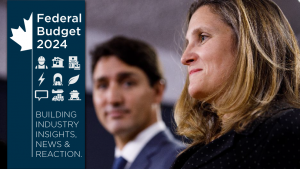With the world facing a $57-trillion infrastructure gap and Canada investing tens of billions on its own infrastructure projects, it has never been more important to ensure the construction sector adheres to the highest international project management standards, the president of the Royal Institution of Chartered Surveyors (RICS) said on a recent visit to Toronto.
Upon assuming the RICS presidency last June, Amanda Clack, who works as a partner and head of infrastructure (advisory) at EY in the U.K., announced she would spend her year focusing on three themes: infrastructure, cities and the "war for talent."
But as she tours the world she often has to explain the RICS role first.
"RICS looks at land, construction, infrastructure and property," Clack said. "If you think about it, land is the underpinning element you need to build on, it has an asset value in itself, then you go through your design and construction phases, and then you have that real estate side of it."
One of Clack’s main reasons for visiting Toronto for a few days the week of Feb. 6, besides visiting the new RICS office in the city, was to participate in a roundtable session on the infrastructure challenges facing North American cities.
RICS will be presenting its findings based on a series of roundtable events at a major conference it will host in Chicago this spring.
Amanda Clack
RICS
Clack’s priorities as RICS president are linked, she explained. Globally, 54 per cent of the world’s population lives in cities — it’s 85 per cent in Canada — and by 2050 the world’s population will be nine billion with 66 per cent city dwellers.
"We are going to have massive urbanization growth, and we are going to have to have really good infrastructure to both support that urbanized environment and also provide the connectivity between cities. If we don’t invest in infrastructure we are not securing the economies of the future."
RICS is royally chartered with a mandate to act in the public interest, Clack explained. Recent RICS efforts have included collaborating with the Canadian Institute of Quantity Surveyors to publish guidelines to standardize practices for independent construction project monitors and partnering with the U.S.-based National Institute of Building Sciences to determine how public-private partnerships (P3s) can be used to promote high-performance buildings.
"Standards are important. Standards matter," said Clack.
"You kind of say, why bother with international standards? Because it is all about trust. If you have international investors who are looking at a portfolio of interests across the globe, they need to be able to compare and contrast those investments, and infrastructure is a really good one. Infrastructure is an increasing asset class that pension funds for example would be looking to invest in around the world."
As an international body, RICS is well positioned to identify best practices around the world, such as ensuring project lifecycles and climate change resilience are incorporated early into project planning, said Clack.
"I think you have to have your eyes on the world stage because we are all competing on the world stage," she said.
"Places like Shanghai, with a population of 24-million people, are competing with Australia…so if you look internationally at what everybody else is doing, it is about kind of stealing the best ideas, making sure you have adoption of those really great ideas. But then for me it is think globally, act locally. You have to translate it to see what is going to work for the city’s citizens and city’s users in your own country."
The war for talent — referring to the urgent worldwide need to attract talented professionals to the construction sector — could be met in part by embracing diversity, including ensuring more women are recruited, Clack said. She noted she is only the second female president in RICS’s 149 years of existence.
"I think I have the duty to make sure it’s way up there on the agenda and to help change the dial and bring more women into the profession," said Clack.
"It is an easy ask because it is a profession that I love."
Clack said P3s will play an increasing role in delivering the infrastructure the world needs but clients need to be judicious to ensure it is used in the right circumstances.
"We have been supportive of P3s for schemes around the world," she said.
"It is all about risk apportionment and where you want risk to be held. I think that has to be a decision that each individual client has to make. The client has to take the market conditions into account and figure out what is going to create the most value."











Recent Comments
comments for this post are closed